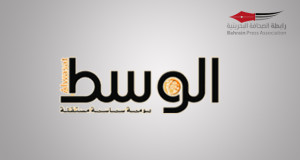The longest ban period for al-Wasat newspaper raises real concern about its future
London – June 8, 2017 – Bahrain Press Association: It’s been four days since the Bahraini authorities blocked al-Wasat newspaper in both its paper and electronic versions, which is the longest-running ban of the only independent newspaper.
On April 3, 2011, al-Wasat newspaper was banned from publishing for one day after being accused of unethical coverage and spreading false news about the protests in the country. Later, according to an impartial investigation, it was revealed that official sources were involved in providing the newspaper with such news for political and reprisal purposes.
On August 6, 2015, the government banned al-Wasat again for two days. This time, the charge was “breaking the law and provoking discrimination in the community”. By the beginning of this year, the authorities banned al-Wasat from online publishing for three days, after publishing the pictures of three young men who were executed by the government and an article about the protests in the Moroccan Rif (countryside).On June 4 of this year, the Information Authority announced a new ban for harming relations with countries. The Bahrain Press Association did not find in the article anything in contradiction of “the values of journalism or the determinants of professional journalism”. Therefore, the Association considered this decision an intentional targeting for revenge, and considered that it “growths fears that Bahrain is accelerating towards further restrictions of press freedoms.”
The Committee to Protect Journalists (CPJ) Deputy Executive Director Robert Mahoney said “al-Wasat has long been a scapegoat for the government which fears of allowing free press”, and called for an immediate termination of the ban.
Mansoor al-Jamri, the newspaper’s editor-in-chief, described the order as “a total surprise.” And told the Associated Press “There were basically no legal procedures”.
He explained to the Committee to Protect Journalists (CPJ) that “The absence of any communication with the authorities left the newspaper unsure about how to continue working”. The absence of legal procedures left them in “the dark.”
Despite the fact that the law regulating the press, printing and publishing in Bahrain states that “newspapers may not be confiscated, blocked or revoked except by virtue of the judiciary”, al-Wasat ban was supported each time by an administrative decision.
Brian Doley of Human Rights First described the decision as “a step that reflects the panic of the authorities which are afraid of the facts and the good press”.
Doley said in a statement that “Today’s (Sunday) move is the last attempt of Bahrain to prevent embarrassing coverage of what is going on in the country”.
By the end of the fourth day and the absence of communication with the official authorities, the fear is real that the authorities are determined to finish off al-Wasat and silence its voice. There is no doubt that such a decision would end the remaining freedom of press in Bahrain.
